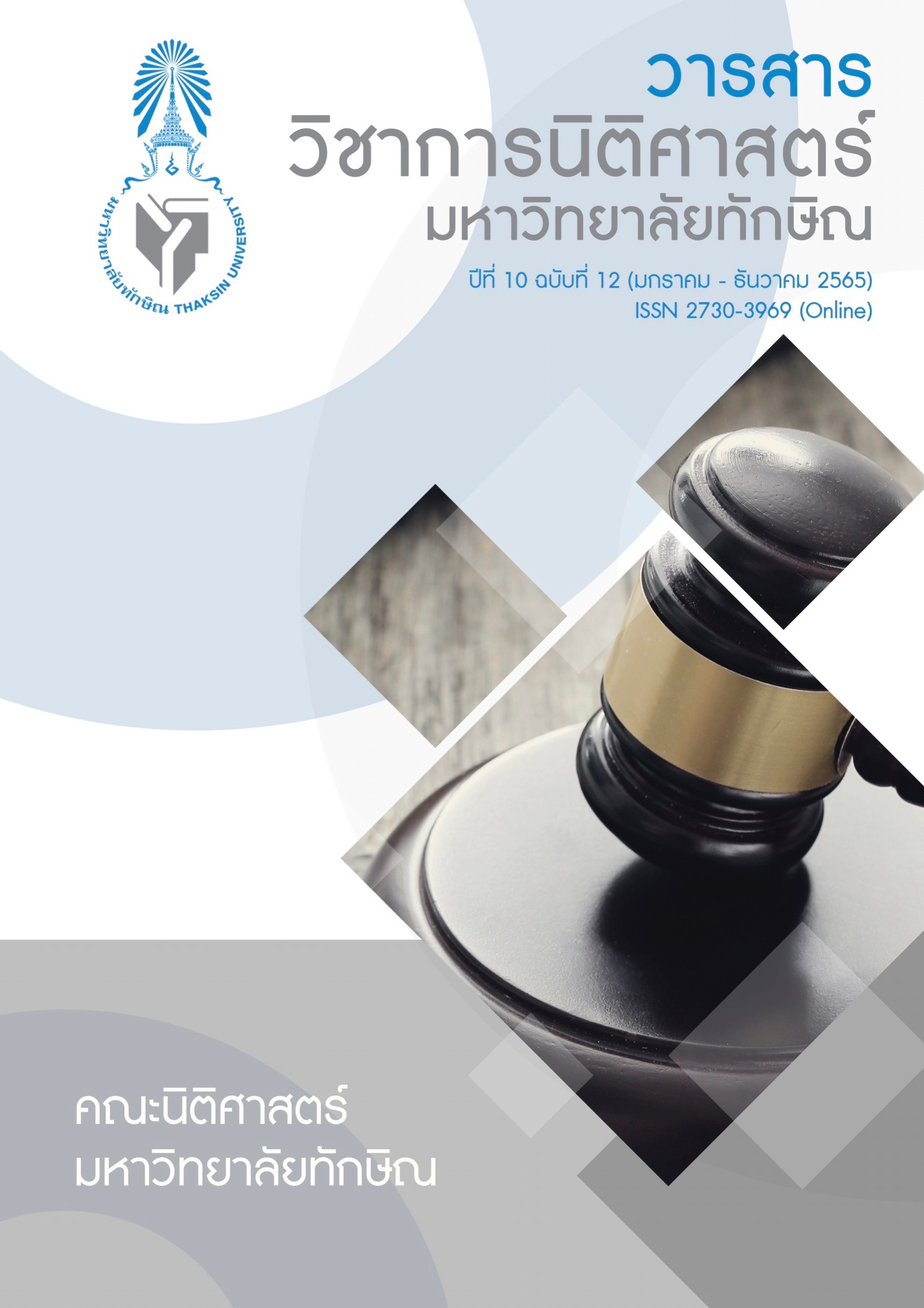มุมมองของสิทธิมนุษยชนต่อหลักความรับผิดโดยเด็ดขาด ในกฎการใช้สารต้องห้ามสำหรับนักกีฬา
คำสำคัญ:
สิทธิมนุษยชน, ความรับผิดโดยเด็ดขาด, การต่อต้านการใช้สารต้องห้ามบทคัดย่อ
หลักความรับผิดโดยเด็ดขาดในนโยบายและกฎระเบียบว่าด้วยการต่อต้านการใช้สารต้องห้ามสำหรับนักกีฬาสากลที่ถูกขับเคลื่อนโดยองค์กรต่อต้านการใช้สารต้องห้ามโลกและการกำกับควบคุมการใช้สารต้องห้ามสำหรับนักกีฬาในลักษณะที่แผ่ขยายไปทั่วโลก หลักการเช่นนี้เป็นหลักความรับผิดโดยปราศจากความผิดจากการใช้สารต้องห้ามสำหรับนักกีฬา เมื่อปรากฎชัดเจนว่ามีสารต้องห้ามสำหรับนักกีฬาได้รับเข้ามาในร่างกายของนักกีฬาไม่ว่าจะเป็นทางตรงหรือทางอ้อม แม้ว่าตัวของนักกีฬาเองไม่ได้จงใจใช้สารต้องห้ามสำหรับนักกีฬาก็ดีหรือประมาทพลาดพลั้งไปรับสารต้องห้ามสำหรับนักกีฬาเข้ามาสู่ร่างกายของตนก็ตาม โดยหลักการนี้มุ่งสนับสนุนส่งเสริมให้เกิดความโปร่งใส่ ความเป็นธรรมและความรับผิดชอบต่อองค์กรกำกับกีฬา องค์กรกีฬา สโมสรกีฬา นักกีฬาและผู้มีส่วนได้ส่วนเสียที่เกี่ยวข้องในการดำเนินกิจกรรมกีฬาหรือการแข่งขันกีฬาในทุกระดับชั้น การก่อความผูกพันทางกฎหมายที่ต้องยอมรับนับถือหลักความรับผิดโดยเด็ดขาดในกฎการใช้สารต้องห้ามสำหรับนักกีฬานั้น เกิดขึ้นมาจากความพยายามทำให้กฎและระบบขององค์กรต่อต้านการใช้สารต้องห้ามโลกมีความเป็นสากล
อย่างไรก็ตามการใช้หลักการดังกล่าวต่อการต่อต้านการใช้สารต้องห้ามสำหรับนักกีฬาในนักกีฬาทำนองที่ตัวนักกีฬาเองได้ใช้สารต้องห้ามสำหรับนักกีฬาโดยไม่เจตนาหรือประมาทพลาดพลั้งไป
รับสารต้องห้ามสำหรับนักกีฬาใด ๆ เข้ามาสู่ร่างกายของตนก็อาจสร้างความไม่เป็นธรรมบางประการต่อนักกีฬา บทความฉบับนี้ศึกษาหลักการภายใต้ประมวลกฎการต่อต้านการใช้สารต้องห้ามโลกขององค์กรต่อต้านการใช้สารต้องห้ามโลกที่อาจมีหลักการอันท้าทายต่อสิทธิในการทำงานและสิทธิในการเล่นกีฬาของนักกีฬา ดังที่องค์กรต่อต้านการใช้สารต้องห้ามโลกและศาลอนุญาโตตุลาการทางการกีฬา
ได้เคยวินิจฉัยเอาไว้ บทความฉบับนี้ยังมุ่งพิจารณาประเด็นปัญหาเกี่ยวกับการบังคับใช้หลักความรับผิดโดยเด็ดขาดในกฎการใช้สารต้องห้ามสำหรับนักกีฬาที่อาจส่งผลกระทบต่อสิทธิบางประการของนักกีฬา
เอกสารอ้างอิง
Office of National Drug Control Policy. (2021). Report on World Anti-Doping Agency Governance as required by House Report 116-456.Washington, DC: Office of National Drug Control Policy.
UK Anti-Doping. (2021). What's banned in sport - the Prohibited List. Retrieved January 22, 2022, from https://www.ukad.org.uk/athletes/whats-banned-sport-prohibited-list.
Girginov, V. (2006). Creating a Corporate Anti-doping Culture: The Role of BulgarianSports Governing Bodies, Sport in Society, 9(2), 252-268.
Tan, T. C.,Bairner, A. & Chen, Y. W. (2018). Managing compliance with the World Anti-Doping Code: China’s strategies and their implications.International Review for the Sociology of Sport,55 (3), 251-271.
World Anti-Doping Agency. (2022). Who We Are, Retrieved January 24, 2022, from https://www.wada-ama.org/en/who-we-are?
World Anti-Doping Agency. (2021). World Anti-Doping Code. Retrieved January 24, 2022,from https://www.wada-ama.org/sites/default/files/resources/files/2021_wada_code.pdf
du Toit, N. (2011). Strict liability and sports doping - what constitutes a doping violations and what is the effect thereof on the team?,TheInternational SportsLaw Journal, 3-4 (July-Oct), 163-164.
Amos, A. (2007). Inadvertent Doping and the WADA Code, Bond Law Review, 19 (1), 1-25.
Fuchs, P. (2013). The Sanctioning Process for Specified Substances in the 2015 World Anti-Doping Code - A Fresh Start?,Australian and New Zealand Sports Law Journal, 8 (1), 127-142.
World Anti-Doping Agency. (2021). 2021 World Anti-Doping Code and International Standard Framework Development and Implementation Guide for Stakeholders.Retrieved January 24, 2022, fromhttps://www.wada-ama.org/sites/default/files/resources/files/worldconferencebackgrounder_0.pdf.
World Anti-Doping Agency. (2022). Therapeutic Use Exemptions. Retrieved January 24, 2022, fromhttps://www.wada-ama.org/en/athletes-support-personnel/therapeutic-use-exemptions.
World Anti-Doping Agency. (2014). WADA Independent Observer Mission Report 17th Asian Games (Incheon, South Korea) 19 September – 4 October 2014.Retrieved January 24, 2022, from https://www.wada-ama.org/sites/default /files/resources/files/io_report_incheon_2014.pdf.
Selthoffer, S. V. (2016). The Failure of WADA Communications And the Power of Condemnation.Retrieved January 26, 2022, fromhttps://www.sportsintegrityinitiative.com/opinion-failure-wada-communications-power-condemnation/.
LawInSport. (2018). Sport’s Human Rights Requirements: An Opportunity and Challenge for Sports Lawyers As Well As Sports Governing Bodies. Retrieved January 25, 2022, from https://www.lawinsport.com/topics/features/item/sport-s-human-rights-requirements-an-opportunity-and-challenge-for-sports-lawyers-as-well-as-sports-governing-bodies.
Commonwealth Forum of National Human Rights Institutions. (2022). Sport and Human Rights. Retrieved January 26, 2022, from https://cfnhri.org/human-rights-topics/sport-and-human-righ
ดาวน์โหลด
เผยแพร่แล้ว
ฉบับ
ประเภทบทความ
สัญญาอนุญาต
ลิขสิทธิ์ (c) 2022 วารสารวิชาการนิติศาสตร์ มหาวิทยาลัยทักษิณ

อนุญาตภายใต้เงื่อนไข Creative Commons Attribution-NonCommercial-NoDerivatives 4.0 International License.
บทความที่ได้รับการตีพิมพ์เป็นลิขสิทธิ์ของวารสารวิชาการนิติศาสตร์ มหาวิทยาลัยทักษิณ
ข้อความที่ปรากฏในบทความแต่ละเรื่องในวารสารวิชาการเล่มนี้เป็นความคิดเห็นส่วนตัวของผู้เขียนแต่ละท่านไม่เกี่ยวข้องกับคณะนิติศาสตร์ มหาวิทยาลัยทักษิณ และคณาจารย์ท่านอื่นๆในมหาวิทยาลัยฯ แต่อย่างใด ความรับผิดชอบองค์ประกอบทั้งหมดของบทความแต่ละเรื่องเป็นของผู้เขียนแต่ละท่าน หากมีความผิดพลาดใดๆ ผู้เขียนแต่ละท่านจะรับผิดชอบบทความของตนเองแต่ผู้เดียว



